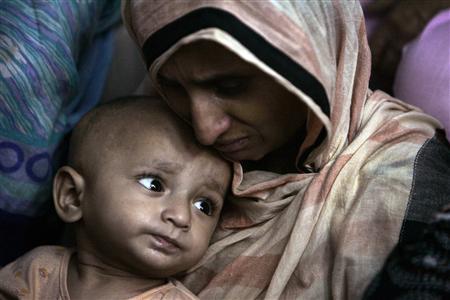
To respond to such a miserable situation, the experts said Pakistan needs to impose a health emergency in the country to curb the high rate of maternal deaths — a situation compounded by the inability of cash-strapped health staff to tackle maternal emergencies.
The experts expressed these views at the concluding session of a three-day long training workshop on Basic Emergency Obstetrics & Neonatal Care (BEmONC). The workshop had been conducted by the Reproductive Health Research Center (RHRC) in collaboration with Medicins de Monde, on basic emergency services regarding maternal and newborn health by a team of health professionals from various institutions.
The workshop’s objective was to enhance the professional skills of doctors, community midwives and lady health visitors to handle infections, postpartum haemorrhage, eclampsia and other diseases that contribute to maternal and neo natal mortality.
At the opening of the workshop, Pakistan Institute of Medical Sciences (Pims) Mother and Child Health Department Head Professor Syeda Batool Mazhar said that a 2015 Population Council fact sheet found that there were around 14,000 maternal deaths in the country every year.
Of these, she said, 4,500 mothers could be saved through interventions at the primary level if only the capacity of staff is built and the health care system is strengthened.
She urged skilled health professionals to concentrate on the ‘three major killers’, which have persisted through the years, including excessive bleeding after childbirth (postpartum haemorrhage), infections and high blood pressure (Eclampsia).
Quoting data gathered by the Population Council, she said that 6,000 women die every year due to pregnancy-related complications in Punjab, 3,000 in Balochistan, 2,800 in Sindh and 1,700 in Khyber-Pakhtunkhwa (K-P).
Dr Tehmina Farrukh, a consultant gynaecologist at the Federal General Hospital, said that the healthcare situation in rural areas was far worse than those in the urban areas since they even lack the capacity to handle normal delivery cases.
“The major reason for this was that there was a shortage of trained staff at the [rural health] centres and women have to travel long distances to reach health facilities to give birth to a child,” Dr Farrukh said.
“Many of them die during the travel.”
MNCH Consultant Dr Samina Khalid said that there should be a system to ensure timely access to health services to avoid ‘four delays’.
Noting that exact figures on maternal health issues were not available owing to underreporting, she suggested engaging the male partners and fathers. She further suggested that the government provide better health facilities.
MDM Medical Coordinator Dr Qamar Zaman highlighted the high maternal mortality rate in Pakistan.
Noting that there were several areas where doctors were not available, services can be improved by building the capacity of paramedics.
During the training, MVA and medical treatment in post-abortion care to prevent maternal ill health were highlighted along with the importance of post-abortion and post-partum health care.
Published in The Express Tribune, December 7th, 2017.

















COMMENTS
Comments are moderated and generally will be posted if they are on-topic and not abusive.
For more information, please see our Comments FAQ